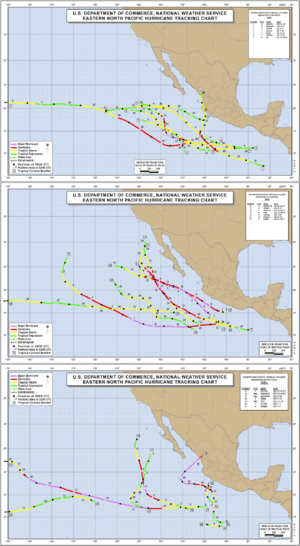1983 Pacific hurricane season facts for kids
 |
|
| Season summary map | |
| First storm formed | May 21, 1983 |
|---|---|
| Last storm dissipated | December 7, 1983 |
| Strongest storm | Kiko and Raymond - 125 knots (232 km/h) – |
| 21 | |
| Total fatalities | Unknown |
| Total damage | Unknown |
| seasons 1981, 1982, 1983 1984, 1985 |
|
The 1983 Pacific hurricane season was a time when many strong storms formed in the Pacific Ocean. It officially began on May 15, 1983, and ended on November 30, 1983. These dates are when most tropical cyclones usually happen in this part of the world.
This year was very busy, setting a record with 21 named storms. Out of these, 12 grew into hurricanes. Eight of these hurricanes became very powerful, reaching Category 3 or higher on the Saffir–Simpson Hurricane Scale. A strong weather event called El Niño made the ocean waters warmer, which helped create so many storms. This same El Niño also made the Atlantic hurricane season much quieter.
Some of the most important storms were Hurricane Tico, Tropical Storm Octave, and Hurricane Winnie. These storms caused damage and affected many people.
Contents
What is a Hurricane Season?
A hurricane season is a specific period each year when tropical cyclones are most likely to form. These powerful storms get their energy from warm ocean waters. In the eastern Pacific, the season usually runs from May to November.
During this time, weather experts watch the ocean closely. They look for signs of storms forming. When conditions are right, small disturbances can grow into tropical depressions, then tropical storms, and finally, hurricanes.
A Busy Year for Storms
The 1983 Pacific hurricane season was one of the busiest ever recorded. A total of 21 storms were strong enough to be given names. This was a new record for the Pacific Ocean at that time.
Out of these 21 named storms, 12 became full-blown hurricanes. Even more impressive, eight of these hurricanes became "major hurricanes." This means they reached Category 3 or higher on the Saffir–Simpson Hurricane Scale. These are the most powerful and dangerous types of hurricanes.
The Role of El Niño
A big reason for all this storm activity was a strong El Niño event. El Niño is a natural climate pattern. It involves the warming of ocean waters in the central and eastern Pacific.
Warmer ocean water provides more energy for storms to grow. This extra energy helped many storms become very strong in 1983. Interestingly, this same El Niño made the hurricane season in the Atlantic Ocean much calmer than usual.
Notable Hurricanes
Several storms during the 1983 season caused significant impacts. Three of them stood out: Hurricane Tico, Tropical Storm Octave, and Hurricane Winnie. Each of these storms affected different areas and left lasting memories.
Hurricane Tico
Hurricane Tico was a very strong storm. It formed in October 1983. Tico became a major hurricane, reaching Category 3 strength.
When Tico hit land, it caused a lot of damage. Thousands of people in the city of Mazatlan, Mexico, lost their homes. The storm's strong winds and heavy rains destroyed buildings and flooded areas.
Tropical Storm Octave
Tropical Storm Octave was unusual because of where it caused problems. It formed in September 1983. Octave brought heavy rainfall far inland, reaching the state of Arizona in the United States.
The storm's rains led to severe flooding in Arizona. This flooding was one of the worst natural disasters the state had ever seen. Sadly, several people lost their lives because of the floods caused by Octave.
Hurricane Winnie
Hurricane Winnie was a rare storm for its time of year. It formed in December 1983, after the official end of the hurricane season. This made Winnie a very unusual late-season cyclone.
Winnie was a strong hurricane, reaching Category 3 strength. While it did not make landfall, its late appearance showed how powerful the ocean conditions were that year. It was a reminder that storms can sometimes form outside the typical season.
 | Bayard Rustin |
 | Jeannette Carter |
 | Jeremiah A. Brown |


 In Spanish:
In Spanish: